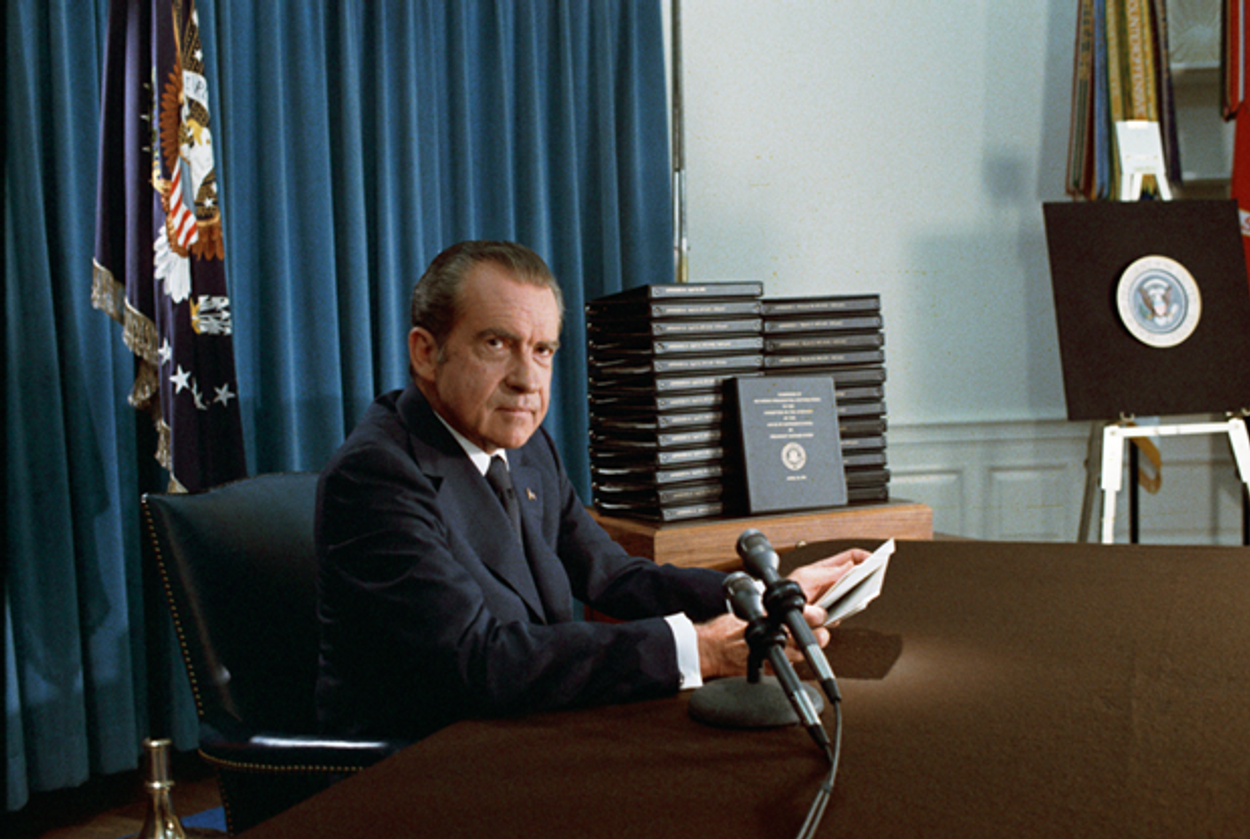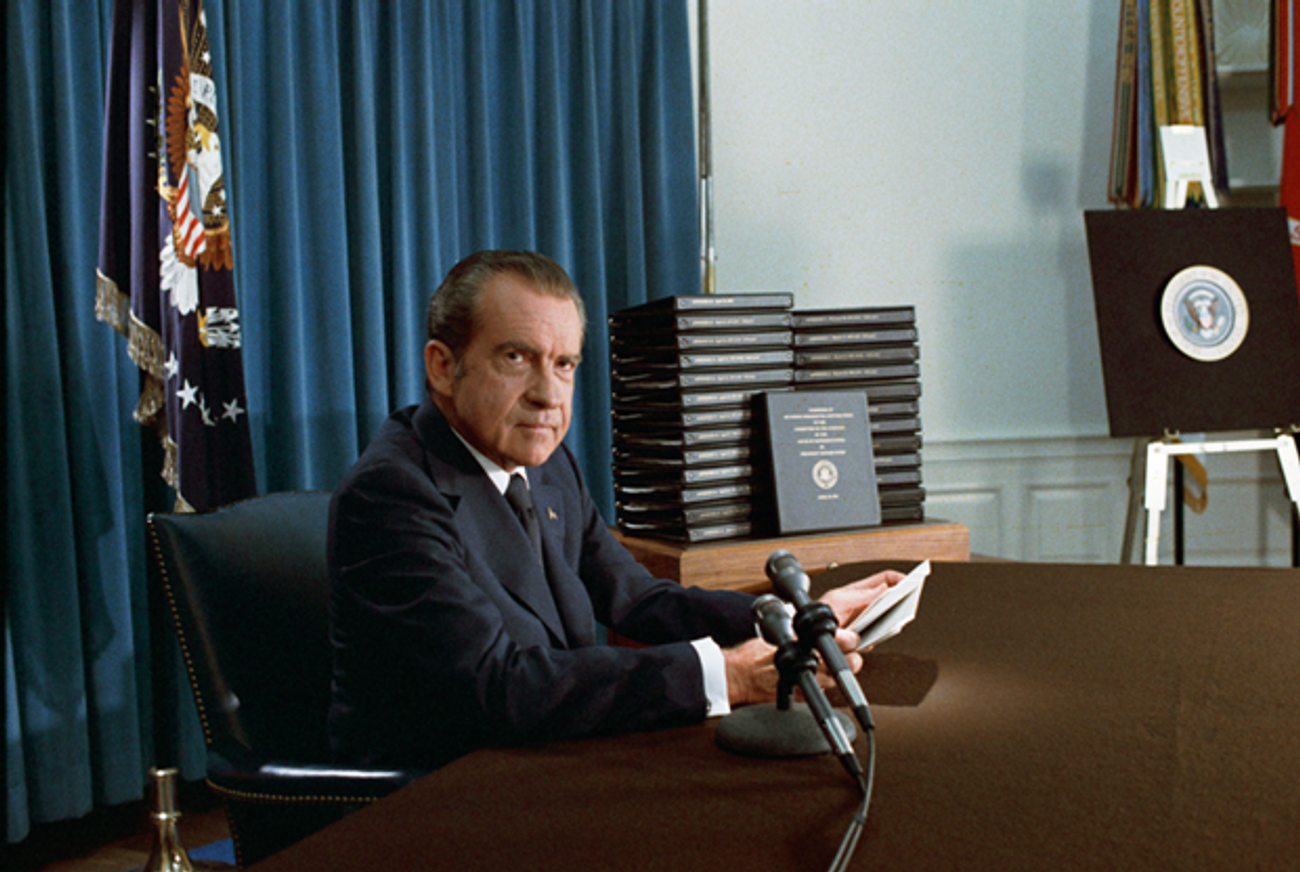Little Rascal
Forty five ago, Philip Roth sent up Nixon in an overlooked satire that expanded his turf from neurosis to the American political canvas.




George W. Bush’s governing style has prompted analogies with Richard Nixon’s, both for its hallmarks—the taste for dirty tricks, the bullying, the secrecy—and for the outrage it has aroused. Having taken its place in the lexicon alongside “Nixon-hating,” “Bush-bashing” now rivals the former phenomenon in its acid fury.
As the longtime bedfellow of outrage, satire is also these days enjoying a revival, with anti-Bush web cartoons and indie films recalling the scathing underground humor to which Nixon gave rise. Recent proof comes from Philip Roth, whose stature as America’s greatest living novelist has obscured his gifts as a political commentator and satirist. Writing about his new book, The Plot Against America, Roth recently described the incumbent as “a man unfit to run a hardware store let alone a nation like this one.” Although The Plot isn’t “about” Bush—it’s hard to imagine Roth serving up a topical roman à clef—a fear about the contingent and fragile nature of American democracy that Bush has engendered clearly animates this book.
It was Nixon, though, who first lured Roth into commenting on the news. “Why have I turned to political satire?” he once wrote. “In a word: Nixon.” In the early 1970s, Roth was spending time in Woodstock, New York, where he befriended the painter Philip Guston, a onetime Abstract Expressionist who had moved into cartooning. Egging each other on, the two Philips created two anti-Nixon philippics. Guston came up with his “Poor Richard” drawings, obscene yet oddly understated sketches that, punning on Nixon’s nickname, rendered the president’s famous sloped nose and jowly cheeks as a penis and testicles. Roth came up with the satires, some of which he published in the New York Review of Books, that eventually formed Our Gang (1971). Nixon-haters loved the book, which channels the then-widespread fury toward the loathed chief executive into hilarious artistic expression. But over time Our Gang drifted downward into the tier of Roth’s less read works. Critical opinion couldn’t canonize something so ephemeral as political humor, especially when directed against such an easy mark. Fourteen years after the book’s publication, the cultural historian Stephen J. Whitfield praised Our Gang as “a neat trick of ventriloquism” but pronounced it “not an artistically searing and fulfilling work of literature.”
Our Gang takes the form of a series of mock speeches and press conferences in the voices of Nixon, Spiro Agnew, Billy Graham, and other unsavory figures of the era. It takes off of two events from April 1971: Nixon issuing a statement on behalf of the rights of the “unborn” and his defense of Lieutenant William Calley, the ringleader of the My Lai massacre. From these real incidents, Roth spins out a colloquy in which an unnamed citizen questions President “Trick E. Dixon” on whether Calley should be treated more harshly if he murdered any pregnant women at My Lai. (“Clearly, if she was not yet ‘showing,’ I think you would in all fairness have to conclude that the lieutenant could have had no knowledge of her pregnancy…”) Dixon’s ensuing decision to endorse voting rights for the unborn leads to his denunciation by the Boy Scouts for favoring “fornication—between people!” Dixon and his aides then hatch a plan to suppress the Boy Scout uprising, although shipping them to the Arizona desert for gassing is rejected because Dixon opposes federally enforced busing.
Soon, the plotting spirals out of control. Dixon mobilizes the Army to invade the “Pro-Pornography” state of Denmark to “liberate” Elsinore from Danish rule. Curt Flood, the pioneer of free agency in baseball, is set up as a scapegoat. Dixon dies while having surgery to remove the sweat glands from his upper lip. Finally, from the underworld, he mounts his last comeback by challenging Satan for the presidency of Hell.
Throughout, Roth captures Nixon’s trademark cadence and locutions: “I could have done the popular thing and come out against the sanctity of human life. But frankly I’d rather be a one-term president and do what I believe is right.” Roth’s satire, however, isn’t just about language. It’s about the way that the political manipulation of language, along with other violations of the unwritten rules of political behavior, erodes democracy. Adopting a few opportunistic positions leads to knocking off a few Boy Scouts and ultimately to an invasion. Months before the Watergate break-in and years before the full truth about it was known, Roth had zeroed in on Nixon’s readiness to do whatever it took to shore up his position and power.
Roth continued to fret about Nixon’s lust for power, the most dangerous that can exist in a president. Indeed, two years after Our Gang was published, the novelist penned a follow-up of sorts in The New York Review of Books in which Nixon speaks to the nation:
My fellow Americans, though I respect the sincerity and the integrity of those senators who voted earlier in the day for my removal, I find after careful study and grave reflection that to accept their decision would be to betray the trust placed in me by the American people.
Nixon explains that he understands some in Congress won’t “respect” his decision and “may attempt to use force to remove me from office.” Therefore, he adds, since his administration “will not tolerate lawlessness of any kind,” he is placing the Army on alert.
By May 1974, Roth’s broad joke had evolved into a genuine fear that Nixon might use military force to stay in office. The New York Post‘s Pete Hamill wrote a column earnestly urging the governor and mayor of New York to “begin planning a program of self-defense in the event of a military coup,” involving the National Guard and citizen’s defense committees. During Nixon’s last days in office, Defense Secretary James Schlesinger famously instructed military personnel to follow White House orders only if he personally approved them.
It wasn’t only in foreseeing a possible Nixonian attempt to hold onto power that Roth displayed prescience. One imagined scenario after another from Our Gang would find actual fruition in the years after the book appeared—if not in the Nixon administration then in the current one. In Our Gang, Trick E. Dixon and his advisers create a list of “five enemies of America” that includes Hanoi, the Berrigans, the Black Panthers, Jane Fonda, and Curt Flood; only two years later did Roth and the rest of the public learn of Nixon’s all-too-real Enemies List (which overlooked Flood and, surprisingly, the Berrigans, yet did include Fonda and the Black Panthers, as well as Carol Channing, Barbra Streisand, and Joe Namath). Dixon’s invasion of Copenhagen, for its part, presages in many of its particulars the invasion of Baghdad, which so many journalists persist in describing with the Orwellian term “regime change” or the inapt label “preemptive war.” Then, too, at one point Dixon compares the attacks on him by the Boy Scouts to those by the Vietnam Veterans Against the War:
Now it was one thing when those Vietnam soreheads came down here to the Capitol to turn their medals in. Everybody knew they were just a bunch of malcontents who had lost arms and legs and so on, and so had nothing better to do with their time than hobble around feeling sorry for themselves. Of course they couldn’t be objective about the war—half of them were in wheelchairs because of it.”
Would Karl Rove have put it much differently?
Roth’s seeming prescience stems from the acuity of his underlying perception of the political scene, his appreciation of the passions that events in the news provoke in publicly engaged citizens—an acuity also on display in The Plot Against America.
In The Plot, as well as in his so-called American Trilogy of the 1990s (American Pastoral, I Married a Communist, and The Human Stain) and his novels dealing with contemporary Israeli society (The Counterlife and Operation Shylock), Roth uses history and current affairs to make real the dilemmas, aspirations and anxieties of his psychologically intricate characters. In all of these works, Roth integrates the personal and the political, using each to illuminate the other. The real-world developments he presents in these novels command interest not just for their own sake—though Roth’s insights into American Communists in the 1950s and the West Bank settlers of the 1980s are well worth reading—but because he grasps that the importance of national and international events lies largely in the feelings they arouse in ordinary and not-so-ordinary people. A discounted minor classic, Our Gang deserves a fresh look today not least because it inaugurated Roth’s explorations of how politics manifests itself in people’s lives—explorations that have since yielded some of his most compelling and enduring work.